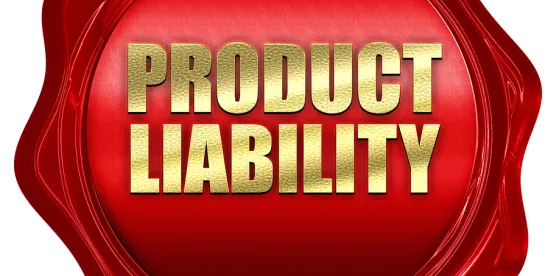The U.S. District Court for the District of New Jersey recently issued a decision that warrants consideration by defendants and their insurance carriers in product liability actions when facing claims relating to the content of packaging and, more specifically, allegations that a product is falsely represented to be compliant with independent regulating standards.
In Badalamenti v. Resideo Technologies, Inc., et al., (D.N.J. 2024), the district court considered as a matter of first impression whether the purchase of a burglar/fire alarm system, labeled as “UL Listed” but did not in fact meet UL standards, could support claims against the manufacturer defendants premised on that labeling constituting a misrepresentation. The court held that in this context common law claims for negligent misrepresentation, common law fraud, breach of express warranty, as well as statutory claims for violation of New Jersey’s Consumer Fraud Act (CFA) and New Jersey’s Truth in Consumer Contract, Warranty, and Notice Act (TCCWNA) fail as a matter of law.
Background
The homeowner-plaintiff, Salvatore Badalamenti, alleged that he intended to purchase an alarm system that was compliant with standards promulgated by Underwriters Laboratories (UL). He purchased a system that was manufactured by the defendants, which was advertised as being “UL Listed” pursuant to its packaging. It was ultimately established that the alarm was not compliant with UL’s standards, although it was UL Listed. The plaintiff filed suit against the manufacturer defendants, who moved to dismiss for failure to state a claim pursuant to Rule 12(b)(6). UL, a private entity that issues safety standards and tests products to ascertain compliance with said standards, was not a party to the suit.
The Decision
The court, after dispensing with the initial fact that the alleged misstatement (that the product was UL Listed) was true, dug into the thornier question that had not been addressed by either the Third Circuit applying New Jersey law or the New Jersey Supreme Court – whether a company makes a false statement when it truthfully states that a product was certified by a third-party entity despite that product not actually meeting the certifier’s underlying standards.
The court surveyed decisions from California, Connecticut, Florida, Illinois, New York, and Texas, which uniformly held that a company does not make a false statement for tort purposes simply because the certifying body erred in making the certification, for lack of New Jersey precedent. The court also concluded that these extra-jurisdictional decisions comported with New Jersey public policy, i.e., that (1) UL’s independence is crucial to its regulating function, (2) UL as a private-party regulator is crucial to New Jersey’s regulatory scheme, and (3) to hold a company vicariously liable for an error by UL in its certifying process would invite undue interference by companies in the certification process.
As a result, the court determined that the necessary element for each of the common law claims for negligent misrepresentation, common law fraud, and breach of express warranty – the actionable false statement – was lacking and, consequently, all such claims failed as a matter of law. The same reasoning was found fatal to the CFA and TCCWNA claims – the lack of an actionable misstatement precluded the possibility of making a prima facie claim for relief. The court left for another day whether claims for breach of implied warranty or unjust enrichment could proceed in this context.
Relevance to Advertising Claims in Product Liability Cases
This decision has several potential implications beyond the initial takeaway that New Jersey, at least at the federal level pending separate action by its state courts, is in line with the balance of the jurisdictions in not holding a company liable for the improper certification sins of its certifier.
First, in reaching its decision:
- The court specifically supposed that a different result may follow if it were demonstrated that a company actively attempted to deceive UL to receive a certification, or if there was improper collusion between a company and UL. These allegations were not before the court.
- Similarly, the court supposed that a different result might be implicated where defendants knew or should have known its product was nonconforming prior to submittal for certification and attempted to slip its deficient product through on hope of oversight. That allegation, though partially levied, failed as being a conclusory recitation of the knowledge element of common law fraud and was insufficiently pleaded to survive.
- The court also noted that a CFA claim can be predicated on a regulatory violation, and theoretically it could be alleged that producing a product that was noncompliant with UL standards constitutes a regulatory violation; however, the court again found that allegation insufficiently pleaded and not argued.
- In these respects it may be unlikely that a New Jersey state court decision would reach the same conclusion at the pre-answer motion to dismiss stage. Stated differently, the fact that New Jersey is a notice pleading jurisdiction, whereas the sufficiency of federal pleadings is adjudged on a plausibility standard, suggests that a reviewing state-level court, at the pre-answer stage, would not be so exacting in its review. Rather, it is likely that these arguments would be available, if at all, only at the conclusion of discovery on a motion for summary judgment This potentiality provides an additional data point for consideration of whether to pursue removal to federal court on diversity jurisdiction in an appropriate case.
Second, it remains essential to subject the language of packaging and advertisements to close scrutiny. It is abundantly clear from this decision that had the packaging stated that the alarm “was compliant with UL standards,” rather than simply stating it was “UL Listed,” the result would be different.



 />i
/>i

